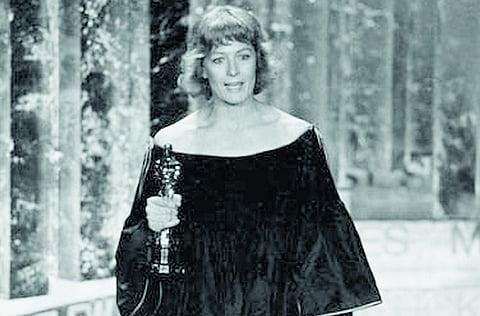Oscars Academy honours Vanessa Redgrave in London
Vanessa Redgrave was hailed at a Hollywood film academy tribute Sunday attended by A-list friends

London: Vanessa Redgrave was hailed at a Hollywood film academy tribute Sunday, praised as an actress and an activist by A-list friends including Ralph Fiennes, Meryl Streep and James Earl Jones.
More than 30 years after she shocked the Oscars ceremony with a fiercely political acceptance speech, Redgrave was the subject of an Academy of Motion Picture Arts and Sciences retrospective - its first to an actor in Europe.
"I love this woman. My wife understands," said Jones, who is currently starring alongside Redgrave in "Driving Miss Daisy" on the London stage.
Profound admiration
"I stand in profound admiration of her courage, both on and off the stage," said Jones, who received an honorary Academy Award on Saturday - presented to him in front of a surprised matinee audience at Wyndham's Theatre.
Redgrave's bold artistic and political choices were a theme of the evening, hosted by playwright David Hare. A member of a famous British acting dynasty that includes her father, sister, brother and two daughters, Redgrave has appeared in more than 100 films since her 1958 debut in Behind the Mask.
She is also known for her humanitarian work as a UNICEF ambassador, and for decades of left-wing political activism. The 74-year-old actress has been nominated for six Oscars and won for her supporting role as an anti-Nazi activist in 1977's Julia.
Startling moment
Her victory led to one of the most startling moments in Oscar history.
The Jewish Defense League had objected to her nomination and picketed the ceremony because Redgrave had narrated and helped fund a documentary, The Palestinian, which supported a Palestinian state.
In her acceptance speech, Redgrave praised the academy for not being intimidated by "a small bunch of Zionist hoodlums whose behaviour is an insult to the stature of Jews all over the world and their great and heroic record of struggle against fascism and oppression".
Her comments were met by gasps, boos and growing applause. Streep - who made her film debut in Julia - said that speech was the moment when she first recognised that "fame was not just this stupid vanity ... you could use it to make a difference in the world".
'My friend, my idol'
Fiennes, British actress Eileen Atkins, Liam Neeson and Jane Fonda added their own tributes to a performer Fonda called "my friend ... my idol .. my mentor."
Hare screened clips from across Redgrave's eclectic career - from landmark 1960s films like "Blow-Up" to the musical "Camelot" and dramas such as Julia and Second Serve, in which Redgrave played transsexual tennis pro Renee Richards.
Hare said she was one of a generation of actresses who "went on to be so much more interesting than their early stereotyping allowed."
But he noted that she was also "fated to live parallel public lives: first as a celebrity and secondly as an actor." Atkins said the two words most often used about Redgrave were "courage" and "radiance".
"And I think that comes from her true belief that basically mankind is very good," Atkins said. "She believes in humanity, and not many people do."



